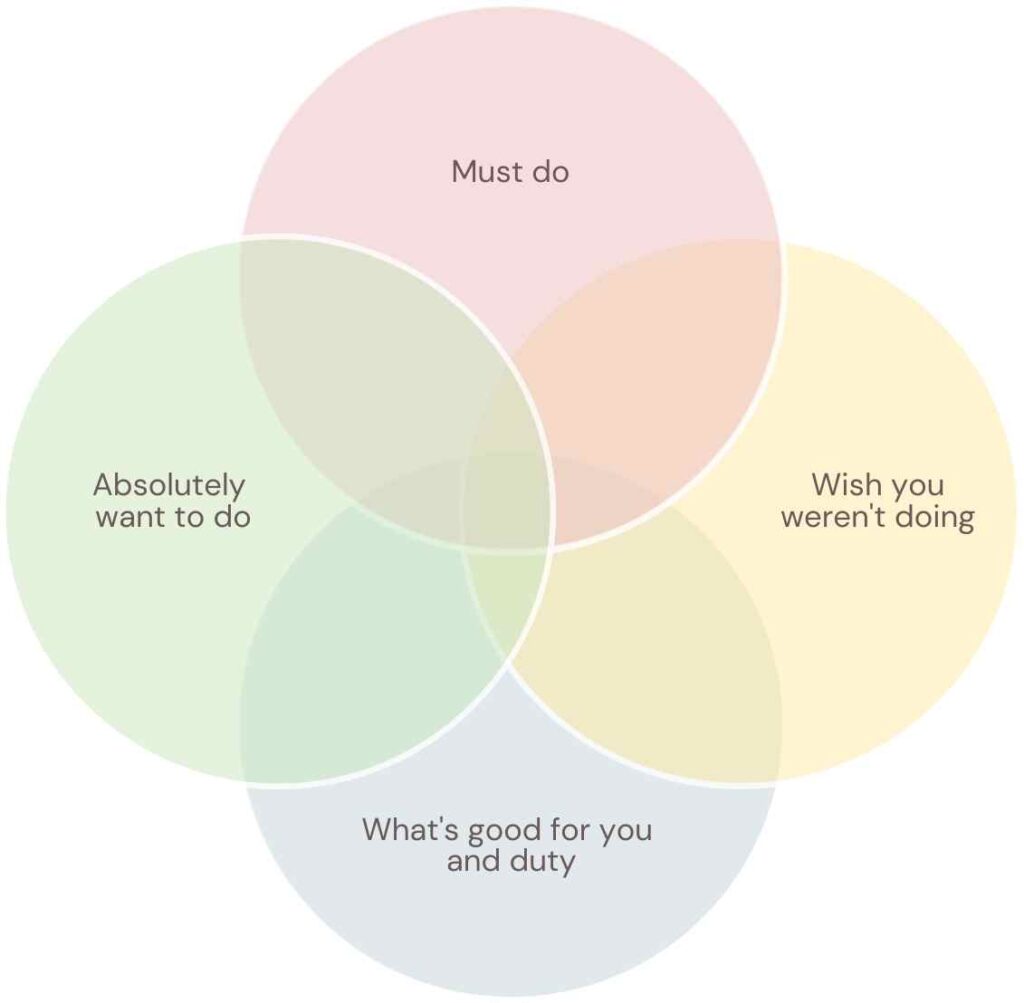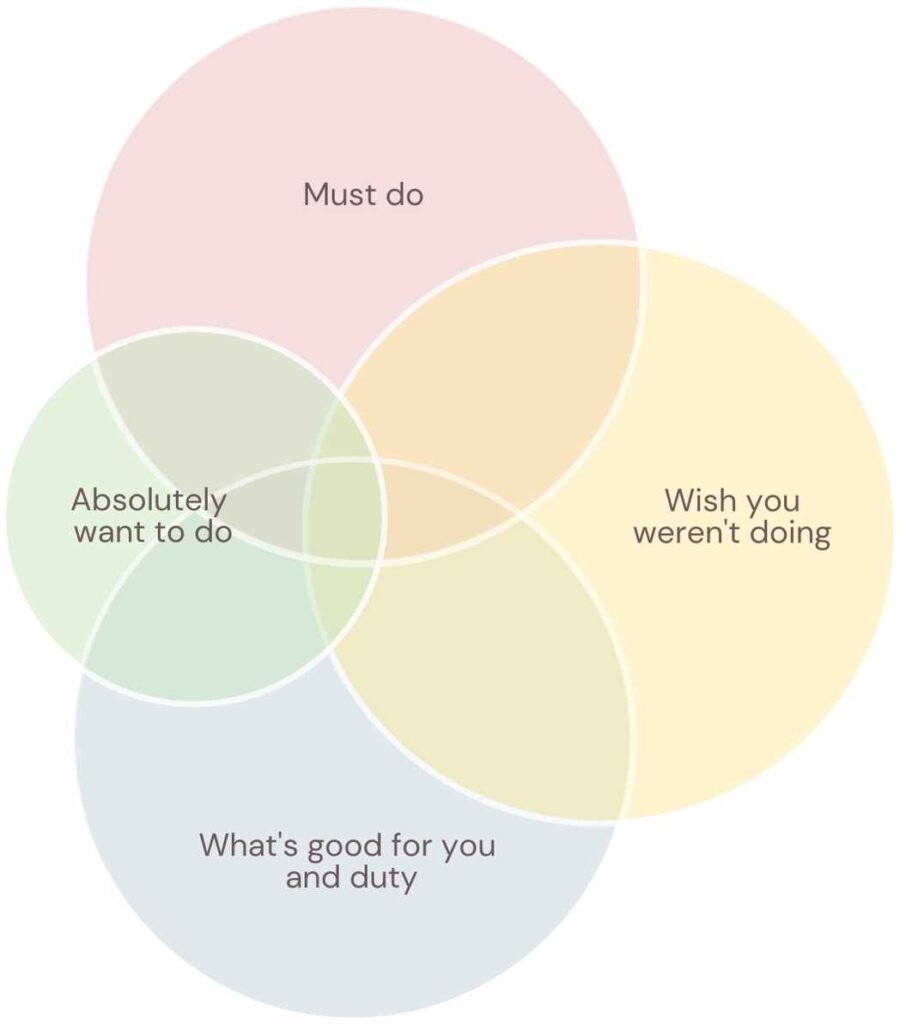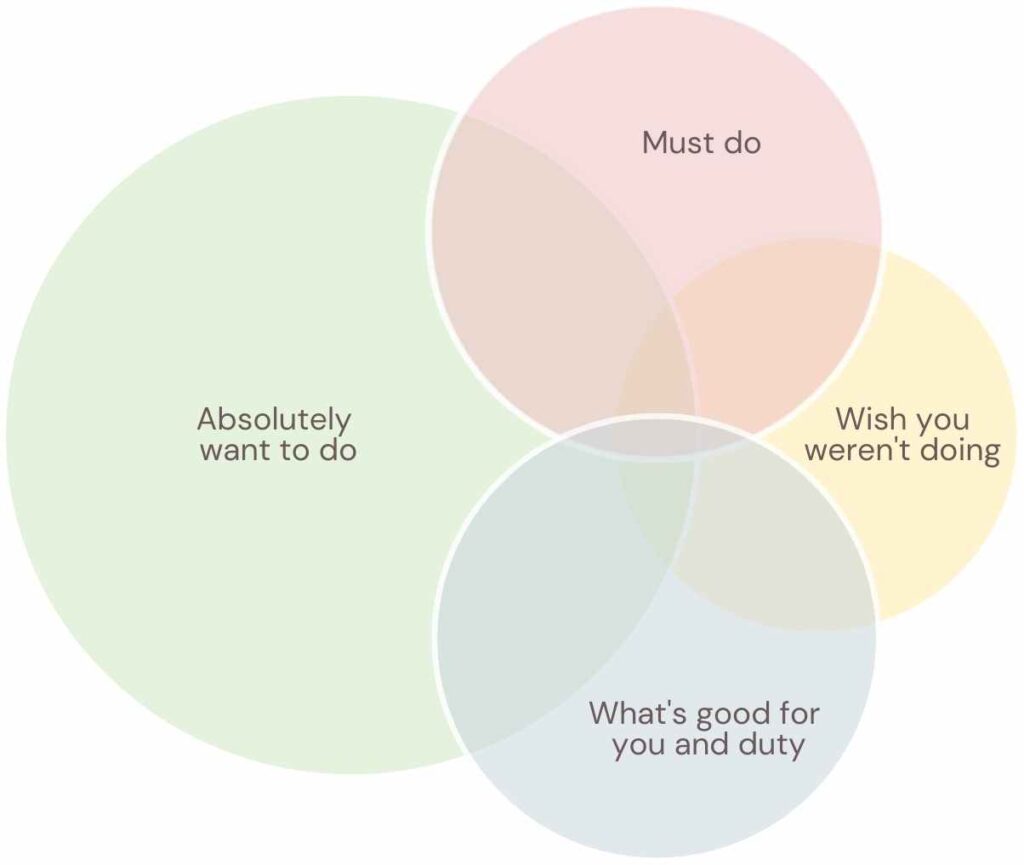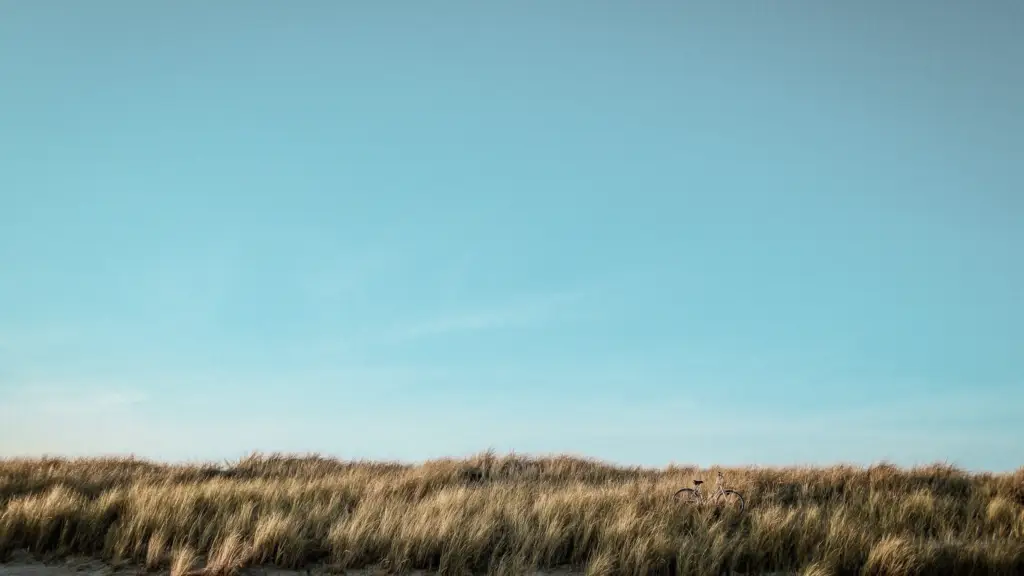Throughout the day, we fill our time with various activities.
We work, do the dishes, drive, check our phones, comfort others, laugh, rest, stare at the ceiling, daydream, play.
Everything we do takes focus.
A large part of our actions are driven by our habits, and we do them without even having to make a decision or think. Some activities feel fun and meaningful, while others feel boring or even uncomfortable.
I find that the things we do can be divided into four different types:
1. Absolutely want to do – for example, engaging in your hobby, read to your children at night, or have dinner with friends.
2. Must do – things you do because you feel you have to, for life to function like work, doing the dishes, food shopping, clean the house.
3. What’s good for you and duty – things you do because you know it’s good for you/your duty/you know you should like brushing your teeth, go to the gym.
4. Wish you weren’t doing – things you wish you hadn’t done and regret afterward like jelling at your children, eating something you feel you shouldn’t have, spending the whole evening on your phone.

We are all different
What ends up in the different categories for you is, of course, unique to you and your life.
The proportions of the different categories and what feels right or wrong will also shift, from day to day and week to week.
Sometimes something feels one way, and sometimes another. That’s life.
But one thing is certain.
The greater the proportion of what you do in your life that falls under the green category: This is what I really want to do, the better your life will feel both today and when you look back.
I don't feel like it anymore!
Do you often regret the plans you made?
Are there a lot of times when you don’t feel like meeting your friends even though you thought you would?
Or, you do you end up wishing you hadn’t decided to go on holiday with that other family.
What happened when I tried to optimize everything and do everything was that more and more of the things I loved doing, and that normally would fall under the category ‘Absolutely want to do’, got swapped and ended up in other categories.
Things I used to want to do became: ‘Must do’, ‘What’s good for med or duty’, and even ‘Wish I wasn’t doing this’.
Picking up the children, which used to be the best moment of my day, became something that felt like a must and filled with stress.
Calling my friends felt like an insurmountable obstacle and became something I pushed into the future.
I didn’t feel like talking to Daniel in the evening; I just longed to be left alone and ended up with my phone in bed instead of being in the living room with him.
Even eating was something I felt I must do as I totally lost my appetite.

I tried optimization
Of course, I realized I had 24 hours per day, and that it was physically impossible to be in two places at the same time – for example, I understood that I couldn’t be at the dentist and also pick up the children at the same time. Even I understood that.
But when it came to my focus, I had the notion that the more I optimized my time, and the more I did, the more life I could squeeze out of a day – and the more I did, the better I would feel.
I was wrong.
The more I tried to do, the less I felt like doing.
Optimizing life isn’t the answer. It’s instead about choosing. Sometimes saying yes, and quite often saying no.
Your precious focus
One thing I’ve learned in recent years is that I only have a limited amount of focus available each day.
it’s the same for all of us.
Your focus is like capital that you have at your disposal and can spend each day. Some days, when you’ve slept well, eaten well, and feel content with life, you have access to a larger capital, and other days, when you’re tired, feeling down, or sluggish, your capital is smaller.
But regardless of whether you have a lot or a little focus to spare today, it is a limited resource.
When your focus runs out, you won’t want to do the things that you know that you love and will instead choose to do things you don’t want to.
Like, instead of calling your friend, you’ll look at your phone. Instead of going to the gym you’ll end up on the couch.
Instead of booking an experience for the family as a Christmas gift, you buy stuff even though you know it won’t last and will just end up unused.
When our focus is spent, we become vulnerable and choose what someone else wants us to choose.
We end up on the couch, and instead of reading a book, we automatically pull out our phone and get caught in whatever the algorithm decides we should get caught in.
We’re tempted to believe we’re not good enough as we are and start looking for anti-aging creams or new dumbbells for the home gym.
Suddenly, the evening is over, and we feel like the day didn’t turn out the way we wanted it to.
You get to choose what you focus on
The only thing that works to manage your focus is to:
1. Understand that your focus is limited
2. Decide what you value
3. Make a simple plan and say yes sometimes and no often
Without knowing what’s important to you it is difficult to know what to focus on. So, figuring out what’s important to you, is the first step.
The aim of each day I guess, is to feel good inside and to feel like most of the things you are doing are things that you want to do. Things that feel meaningful to you.
If each ‘today’ is a good day that feels good inside for you. The sum of many ‘todays’ will be a good life.
So simple, and yet so difficult.

A simple plan for the day ahead
One way to help yourself spend your focus more intentionally is to decide beforehand what you want to focus on.
We all know how the days tend to rush by. The only way I have found helps me be more mindful of what I focus on, is to plan ahead.
It seems like the plan makes it easier for my brain to focus and make smart choices. A few minutes of planning in the morning increases my capacity during the day.
I have found that the more specific I am, the easier it is to follow the plan.
Maybe you would like to try it too? It’s simple!
So, take a few minutes and ask yourself these questions:
– Who do I want to be today
– What are the 2-3 most important things that I want to give my valuable attention to today
– What do I want to create space and awareness for
– How do I feel when I imagine the day ahead
– Is there anything that I need to say no to today, to make space for the things I want to focus on
Is your life too full?
Since I quit my corporate job I have had a couple of periods of studies, I am an entrepreneur and I have worked as a consultant and I have been employed in a start-up company.
Though all these different circumstances one thing stands out.
During the times when I have consistently had more time at my disposal than I need, to do all the things I need to do, I have felt so much better. And, when I have had less time each day, than I would actually need to complete all my tasks, I have felt stressed and unhappy.
It makes sense of course.
I do believe that reducing the amount of tasks/meetings/activities that we have our our plates, so that there is actually enough time in the day to complete all of them, would make us happier.
I aim for 80% during the work week.
That means that I have about 20% of my capacity free to handle things that come up or do things I feel like at the time.
That means that I have time for a spontaneous walk with my friend or watch a movie with my children. It might also mean that I have time to think about work and see problems from a different angle. Or rest.
Just think about it.
What if each day had more focus, capacity and time than you had to spend. So that by the end of the day there was space left to dream and play and relax.
And it turns out that not trying to optimize everything and having some free space makes me much more efficient. And happy! So it’s actually a win-win.
... sometimes you just need a rest
When you feel tired, maybe you are tired.
And when you are tired. Maybe you need to rest?
Just allow yourself to take a break. There is no competition. You don’t have to be anywhere. You don’t have to do things, all the time.
You are allowed to feel tired and you are allowed to rest.




